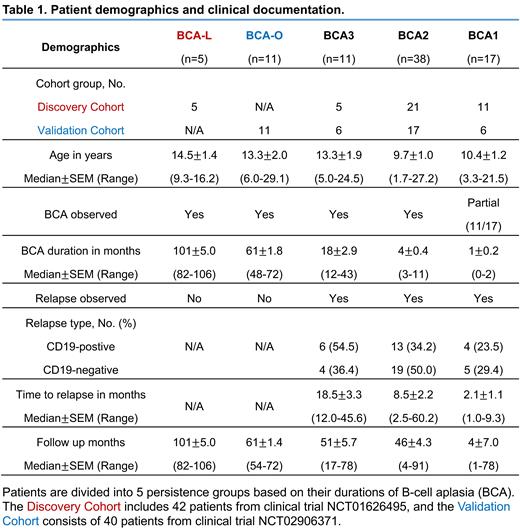Despite a high response rate in chimeric antigen receptor (CAR) T therapy for acute lymphocytic leukemia (ALL), ~50% of patients relapse within the first year, representing an urgent question to address in the next stage of cellular immunotherapy. The pioneering clinical trials conducted at Upenn/CHOP provide a unique opportunity to examine the molecular determinants of ultra-long CAR T persistence.
We performed single-cell multi-omics profiling of ~700k pre-infusion CD19-targeted 4-BB CAR T cells from 82 pediatric ALL patients and 6 healthy donors. Patient demographics were collected between Sep-2012 to July-2022. To uncover the hallmarks of CAR T longevity, we correlated the single-cell atlas with the duration of B-cell aplasia (BCA), a widely used pharmacodynamic measurement of CAR T persistence, and classified all the patients into 5 groups (Table 1). Five patients in our cohort have exhibited a median BCA duration of 8.4 years (BCA-L group) and another 11 patients continue to have BCA with a median time of 5.1 years (BCA-O group). To remove potential confounding variables between trial design, 42 patients including the 5 BCA-L were analyzed as the Discovery Cohort, while the other 40 patients including the 11 BCA-O were used as Validation Cohort.
Our analysis of CD19-specific stimulated CAR T cells from the Discovery Cohort revealed a prominent role of type-1 function, which was highly represented but had no discernible correlation with long-term persistence. Unexpectedly, we identified that elevated type-2 functionality was significantly associated with BCA-L patients maintaining CAR T persistence of 8.4 years, and this signature was robustly presented in the BCA-O patients in our Validation Cohort. Higher type-2 cytokine level of long-term persistent CAR T cells was independently validated using both flow cytometry and multiplexed secretomic assay. Through ligand-receptor interaction analysis, type-2 cytokines were found to regulate a cluster of Tim-3+terminal effector cells showing over activation of cytotoxicity, impaired immune function, elevated exhaustion signature and diminished proliferative potentiality, and CAR T cells from BCA-L patients showed reduced dysfunctional hallmarks.
We next conducted in vitro functional studies to assess the impact of adding type-2 cytokine (IL-4) during CAR-specific activation on CAR T fitness. The addition of 10ng/mL IL-4 significantly boosted the proliferation and mitigated dysfunction of CAR T cells from 6 patients in the BCA2 group that only mediated short-term response (~3 months) and had negligible impact on their type-1 functionality. Remarkably, the functional profile of short-term BCA2 CAR T cells after IL-4 supplementation exhibited a comparable pattern to that of long-term BCA-L CAR T cells, particularly in terms of type-2 pathway, oxidative phosphorylation metabolism, PI3K/AKT signaling, mTOR signaling, and cell cycle regulation.
To investigate the response of the host following CAR T infusion, we performed a comprehensive proteomic profiling of post-infusion serum proteins in a total of 41 patients. Baseline measurements (-2 to 0 days before CAR T infusion) showed a significantly higher level of type-2 cytokines in long-term patients. From the rapid expansion period (day 6-8) until 11 days post-infusion, we consistently observed significantly higher levels of circulating type-2 cytokines in 5-year or 8-year relapse-free responders. Conversely, no difference was observed in type-1 cytokines.
In a leukemic NSG mouse model, both type-2 high and low CAR T cells were highly effective in reducing tumor burden in the first two weeks. However, type-2 high CAR T had significantly superior expansion, and the absolute CAR+ cell counts in peripheral blood were 10-fold higher than type-2 low CAR T at day 8 and day 12. To mimic tumor cell relapse, a second dose of tumor cells were injected into mice on day 17. Notably, type-2 high CAR T cells demonstrated a potent capability to elicit recall responses upon leukemia rechallenge, significantly prolonging the survival of tumor-bearing mice compared to type-2 low CAR T. The superior performance could be associated with their decreased exhaustion and increased memory phenotype.
Our findings provide key insights into the mediators of CAR T longevity and suggest a potential therapeutic strategy to maintain long-term remission by enhancing type-2 functionality in CAR T cells.
Disclosures
Tang:Leman Biotech: Current holder of stock options in a privately-held company, Membership on an entity's Board of Directors or advisory committees. June:AC Immune: Membership on an entity's Board of Directors or advisory committees; BluesphereBio: Membership on an entity's Board of Directors or advisory committees; Cabaletta: Membership on an entity's Board of Directors or advisory committees; Carisma: Membership on an entity's Board of Directors or advisory committees; Cartography: Membership on an entity's Board of Directors or advisory committees; Cellares: Membership on an entity's Board of Directors or advisory committees; Celldex: Membership on an entity's Board of Directors or advisory committees; Decheng: Membership on an entity's Board of Directors or advisory committees; Poseida: Membership on an entity's Board of Directors or advisory committees; Verismo: Membership on an entity's Board of Directors or advisory committees; WIRB-Copernicus: Membership on an entity's Board of Directors or advisory committees; Danaher: Membership on an entity's Board of Directors or advisory committees; Kite Pharma: Consultancy, Membership on an entity's Board of Directors or advisory committees, Research Funding. Grupp:Kite: Research Funding; Servier: Research Funding; CBMG: Consultancy, Membership on an entity's Board of Directors or advisory committees; Adaptimmune: Consultancy, Membership on an entity's Board of Directors or advisory committees; Cellectis: Consultancy, Membership on an entity's Board of Directors or advisory committees; Juno: Consultancy, Membership on an entity's Board of Directors or advisory committees; Allogene: Consultancy, Membership on an entity's Board of Directors or advisory committees; Cabaletta: Consultancy, Membership on an entity's Board of Directors or advisory committees; Jazz: Consultancy, Membership on an entity's Board of Directors or advisory committees, Research Funding; Vertex: Consultancy, Research Funding; Novartis: Consultancy, Research Funding. Fan:AtlasXomics: Membership on an entity's Board of Directors or advisory committees; Singleron Biotechnologies: Membership on an entity's Board of Directors or advisory committees; IsoPlexis: Membership on an entity's Board of Directors or advisory committees.


This feature is available to Subscribers Only
Sign In or Create an Account Close Modal